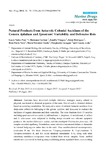Natural Products from Antarctic Colonial Ascidians of the Genera Aplidium and Synoicum: Variability and Defensive Role

Ver/
Use este enlace para citar
http://hdl.handle.net/2183/19531Coleccións
Metadatos
Mostrar o rexistro completo do ítemTítulo
Natural Products from Antarctic Colonial Ascidians of the Genera Aplidium and Synoicum: Variability and Defensive RoleAutor(es)
Data
2012Cita bibliográfica
Marine Drugs 2012, Vol. 10, Pages 1741-1764
Resumo
Ascidians have developed multiple defensive strategies mostly related to physical, nutritional or chemical properties of the tunic. One of such is chemical defense based on secondary metabolites. We analyzed a series of colonial Antarctic ascidians from deep-water collections belonging to the genera Aplidium and Synoicum to evaluate the incidence of organic deterrents and their variability. The ether fractions from 15 samples including specimens of the species A. falklandicum, A. fuegiense, A. meridianum, A. millari and S. adareanum were subjected to feeding assays towards two relevant sympatric predators: the starfish Odontaster validus, and the amphipod Cheirimedon femoratus. All samples revealed repellency. Nonetheless, some colonies concentrated defensive chemicals in internal body-regions rather than in the tunic. Four ascidian-derived meroterpenoids, rossinones B and the three derivatives 2,3-epoxy-rossinone B, 3-epi-rossinone B, 5,6-epoxy-rossinone B, and the indole alkaloids meridianins A–G, along with other minoritary meridianin compounds were isolated from several samples. Some purified metabolites were tested in feeding assays exhibiting potent unpalatabilities, thus revealing their role in predation avoidance. Ascidian extracts and purified compound-fractions were further assessed in antibacterial tests against a marine Antarctic bacterium. Only the meridianins showed inhibition activity, demonstrating a multifunctional defensive role. According to their occurrence in nature and within our colonial specimens, the possible origin of both types of metabolites is discussed.
Palabras chave
Antarctic colonial tunicates
Deterrent activity
Sea star odontaster validus
Amphipod cheirimedon femoratus
Antibacterial activity
Deterrent activity
Sea star odontaster validus
Amphipod cheirimedon femoratus
Antibacterial activity
Versión do editor
Dereitos
Reconocimiento 3.0
ISSN
1660-3397






